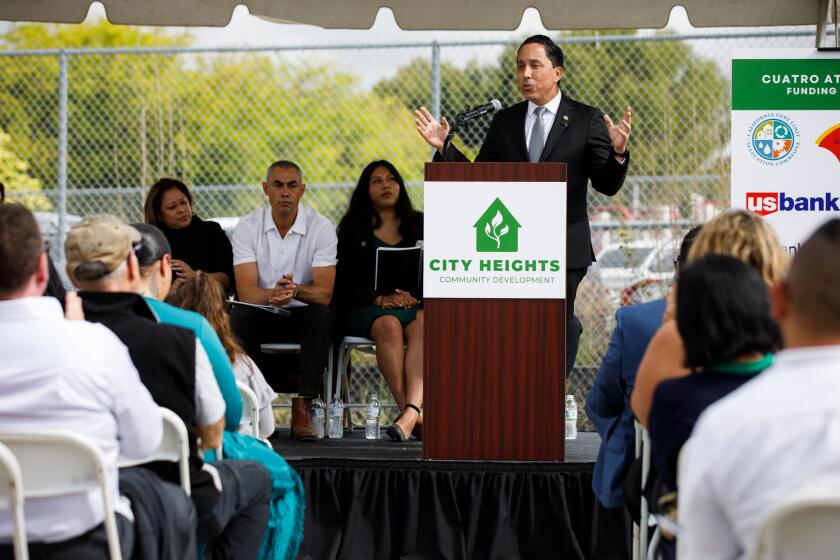She’s got the scoop on job discrimination
Imagine being denied a job because you divulged your family’s medical history in a physical exam during the interview process. Or you were terminated after asking for a workplace coach to help with a medical condition, at no cost to your employer.
These activities are illegal under the federal Equal Employment Opportunity Act, and have been investigated by the San Diego EEOC office in the past year, says Marla Stern-Knowlton, who directs the staff of 10.
The agency received 560 claims of employment discrimination last year, with most having to do with retaliation and race discrimination. Because of confidentiality laws, Stern-Knowlton is only allowed to discuss settlements that employers agree to be made public, or those that can’t be resolved and then become lawsuits.
In 2013, the office obtained a nearly $920,000 settlement against the Sedona Staffing agency, which allegedly failed to refer about 300 job applicants based on their race, color, sex, national origin, age or disability. It also recently sued Kaiser Permanente alleging that a food service worker at its San Diego Medical Center who had hydrocephalus — a condition of abnormal accumulation of fluid on the brain — was denied a reasonable accommodation of a workplace coach, at no charge to the employer, and eventually fired.
In El Centro, the San Diego EEOC sued the Abatti Group and its subsidiaries, All Star Seed, Green Touch Fertilizer and Eight Star Commodities, because they apparently required pre-offer physicals and made illegal inquiries into genetic information unrelated to the job, which they then used as a basis to deny hiring an applicant.
The U-T caught up with Stern-Knowlton at the EEOC offices in Little Italy to talk about current issues in employment. Her answers have been edited for length.
Q: Given the recent cases you could talk about, what can you say about equal opportunity employment in San Diego versus other parts of the country?
A: I don’t know if there’s an overall thought, but I will say there are certain things that I think are relevant to this county and where we work, issues of agricultural workers, issues of vulnerable workers. I think those are things that we feel more strongly here because of our proximity to the border, and so we have a pretty significant monolingual Spanish speaking population who seeks assistance from us.
Q: What issues do these agricultural workers face?
A: We’re looking at issues of sexual harassment, which are fairly significant. That obviously relates to gender discrimination, as well as the issue of job segregation. Agricultural work is cyclical, there are different seasons with different types of work, some of the allegations are women are assigned work that maybe pays less or the season is shorter, or the men have to work for a longer period of time seasonally. There’s also allegations frequently within the industry of some sort of pay discrimination, so it could mean unequal wages for those with respect to national origin, it could also mean gender disparities.
I think we also tend to see in the agricultural industry some allegations of age discrimination, meaning that older workers may assert that they are being discharged and or not hired based on age and preference for a younger worker to do this sort of manual labor. Folks in the agricultural industry tend to be individuals who are monolingual Spanish speakers and tend to potentially not know what their rights are or they’re reluctant or not able to exercise then.
Q: Has your agency spent time reaching out to vulnerable workers recently?
A: We have been having meetings with the Mexican consulate, and what they do is actually take their services out to areas that really need them and they provide guidance, counseling and assistance and we participated in one of their recent ones in Oceanside. We sent an investigator out there, not to solicit. We’re out there just to provide guidance and information and I think they’re such a vulnerable group of workers that information is key. Individuals can file charges with us regardless of their legal status. We don’t ask about it, they’re allowed to file charges and to obtain relief.
Q: Do you see unauthorized immigrants in your office?
A: Sure we do, but it’s a tougher group of people. The commission tends to receive about 100,000 charges on an annual basis everywhere. Our 560 is a small piece of that large number, so as you can imagine we can’t fully investigate all those charges, so recently sort of prudently the commission went ahead and said lets refocus our efforts on six priorities. One of those is protecting immigrant, migrant and vulnerable workers, and so that’s really something that we see here and a real focus of ours obviously. When we get charges from those groups of people, we provide bilingual services, we can also arrange for interpreters for people who have unusual dialects,
Q: What’s important for employers to know?
A: I really think employers need to take complaints of employment discrimination seriously. If they don’t have policies and procedures set up and a well informed workforce, complaints of employment discrimination can’t properly be addressed or investigated or corrected and those problems can sort of fester and grow systemically throughout an organization and at that point it’s going to be too hard for an employer to avoid liability. We really suggest that they develop strong policies and procedures, anti discrimination, retaliation and harassment, and that they communicate those effectively to all the people in their place of employment in a language they understand.
Marla Stern-Knowlton
Position: Director, EEOC
San Diego office
Lives in: Pacific Beach
Age: 52
College: U.C. Santa Barbara, psychology major
Grad School: CSU Northridge, organizational psychology
Husband: Edward
Cat: Bootsy Collins
Hobbies: Skiing, horseback riding, running, pilates
Get U-T Business in your inbox on Mondays
Get ready for your week with the week’s top business stories from San Diego and California, in your inbox Monday mornings.
You may occasionally receive promotional content from the San Diego Union-Tribune.






